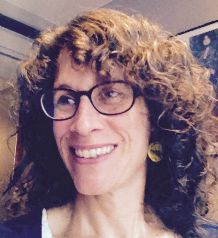Heather Marsden
Professor
Visit Heather Marsden's profile on the York Research Database to:
- See a full list of publications
- Browse activities and projects
- Explore connections, collaborators, related work and more
Profile
Biography
Heather Marsden works primarily in second language (L2) acquisition, focussing on the L2 acquisition of phenomena at the syntax–semantics interface, with a special interest in the L2 acquisition of Japanese and other East Asian languages.
She obtained her first degree in Japanese Studies at the University of Cambridge, and a Diploma in Translation (Japanese to English) from the Chartered Institute of Linguists. She worked as a translator, a language teacher, and a language teaching materials editor, before beginning her academic career in Linguistics with an MA and PhD at the University of Durham.
Career
- University of Cambridge
BA Japanese Studies - University of Durham
MA Linguistics - University of Durham
PhD Linguistics (2004) - Newcastle University
ESRC Postdoctoral Research Fellow (2004 - 2006) - University of York
Lecturer (2007 - 2016)
Senior Lecturer (2016 - present)
Departmental roles
- Co-Deputy Head of Department
- Chair of Teaching Committee
Research
Overview
My research investigates multilingual language acquisition from the perspective of generative linguistic theory. I am particularly interested in the second (or non-native) language (L2) acquisition of linguistic structure at the interfaces of syntax with semantics and discourse, and in the role of input in shaping acquisition. I use psycholinguistic methods to investigate questions such as the following:
- How does the linguistic structure of a previously acquired language affect acquisition in a subsequent language (whether the previous language is a "native" language or a "second", "third", etc. language)?
- How do L2 learners acquire linguistic knowledge for which there is no evidence in the input?
- How does the content of grammar instruction affect acquisition of linguistic structure?
I am also interested in research that integrates L2 acquisition theory and language teaching practice, both at the level of collaborative research and at the level of knowledge exchange. I am particularly interested in the L2 acquisition of East Asian languages, and of languages commonly taught at secondary level in the UK (Spanish, German and French).
Projects
- Interpreting prosody in a second language: cross-linguistic influence in the acquisition of Korean prosody
- Psycholinguistic methods in the language classroom
- Meaning in Language Learning (2014 - 2016)
Teaching
Undergraduate
- Linguistic Approaches to Second Language Acquisition
- Language acquisition
Postgraduate
- Linguistic Approaches to Second Language Acquisition
- First and second language acquisition
External activities
Invited talks and conferences
Selected invited talks
- 2021 - Ambient input, instructed input, and absent input: A reflection on L2 acquisition in different input conditions. Plenary Talk at International Conference of the Japan Second Language Association, Tokyo (held online).
- 2018 - Using Case to predict in the German language classroom: a pilot study. Language Acquisition, Variation and Attrition Group Seminar, UiT The Arctic University of Norway, Tromsø.
- 2018 - Insights for teacher-researcher collaboration, from theoretical linguistic SLA research on English and Spanish. Second language acquisition: linguistic and pedagogical perspectives workshop, UiT The Arctic University of Norway, Tromsø.
- 2017 - Searching for a common language: where do GenSLA research and the language classroom meet? Generative Approaches to Second Language Acquisition (GASLA 14), University of Southampton.
Recent conference papers
- 2024 - Acceptability judgement satiation after sentence processing task: Evidence from Japanese Annual Meeting of the Linguistics Association of Great Britain (LAGB 2024). (with K. Kume).
- 2024 - Can classroom training facilitate predictive processing and oral production of case in L2 German? 33rd Conference of the European Second Language Association (EuroSLA 33), Montpellier, France. (with E. Marsden, H. Hopp, C. Jackson, T. Jochum-Critchley, V. Rogers).
- 2023 - Crosslinguistic influence and proficiency in L2 and L3 knowledge of aspect in Japanese (poster). 32nd Conference of the European Second Language Association (EuroSLA 32), Birmingham, UK. (with A. Hendra & L. Roberts).


